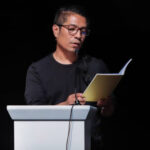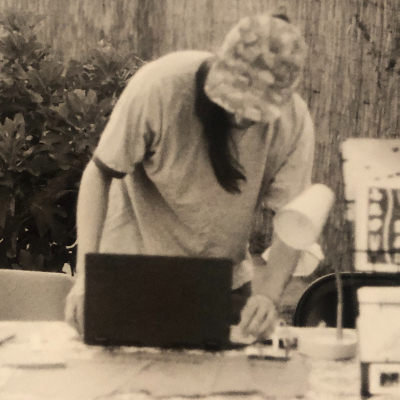Through intertextual intervention, this anti-linear collection reconceives the archives of Phoenix, Arizona to create a counter-map of the city and its trajectories of supremacist violence. [gamerover] tracks trajectories of colonial enterprises, from the Arizona State Fair to the World’s Columbian Exposition in Chicago to the Tornillo Detention Center in Texas, investigating the oppressions of each imperial form in spaces of recreation, exhibition, and spectacle.
Understanding the landscape as an ever-moving hypertext, these poems challenge entrenched means of representation, uses of public space, and positions of witness.
***
WHEEL OF FORTUNE
(excerpts)
![[gamerover], translated by Ryan Greene 1 [gamerover], translated by Ryan Greene](https://latinamericanliteraturetoday.org/wp-content/uploads/2025/09/Fragmento-1_Parte-1_ENG-2-e1759247693718.jpg)
![[gamerover], translated by Ryan Greene 2 [gamerover], translated by Ryan Greene](https://latinamericanliteraturetoday.org/wp-content/uploads/2025/09/Poema-1-Parte-2_ENG-002.webp)
![[gamerover], translated by Ryan Greene 3 [gamerover], translated by Ryan Greene](https://latinamericanliteraturetoday.org/wp-content/uploads/2025/09/Fragmento-2_Parte-1_ENG-1-e1759247626357.jpg)
![[gamerover], translated by Ryan Greene 4 [gamerover], translated by Ryan Greene](https://latinamericanliteraturetoday.org/wp-content/uploads/2025/09/Fragmento-2_Parte-2_ENG-2-e1759247442207.jpg)
![[gamerover], translated by Ryan Greene 5 [gamerover], translated by Ryan Greene](https://latinamericanliteraturetoday.org/wp-content/uploads/2025/09/Fragmento-3_Parte-1_ENG-2-e1759247403569.jpg)
![[gamerover], translated by Ryan Greene 6 [gamerover], translated by Ryan Greene](https://latinamericanliteraturetoday.org/wp-content/uploads/2025/09/Fragmento-3_Parte-2_ENG-2-e1759247368236.jpg)
Notes
The verse “if an empire were fun” is from the book World of Fairs: The Century-of-Progress Expositions by Robert W. Rydell. The verse “the historical fact is a double vision” comes from Public Figures by Jena Osman, and the verses “needs / to experience the present to push through the temporary / crowd who see it get lost in the residue” are inspired by passages from the same book. The expressions “magnificent,” “superabundant,” and “majestic” were extracted from the encyclopedic catalog of the World’s Columbian Exposition, published shortly after the fair ended in 1893, since these were the most recurrent terms used to refer to the Fair itself. The text “it’s an indescribable sensation of revolving / through such a vast orbit in a bird cage” is by Robert Graves and comes from an article by Pagan Kennedy published in the New York Times (“Who Made That Ferris Wheel?”). The text “is a striking example of imprudence and hypocrisy / but people project their most noble aspirations” is by Leo Tolstoy. The text “standard against / which each subsequent [machinery] would be compared” is by Robert W. Rydell.
The term “mummy mining” comes from the book Empires of the Dead: Inca Mummies and the Peruvian Ancestors of American Anthropology by Chistopher Heaney, in which he mentions that in the 1890s, American writers translated the term “huaqueando” as “mummy mining.” This poem owes part of its knowledge about the Peruvian Necropolis at the World’s Columbian Exposition to Heaney’s book, to Laurel Ulrich’s commentary in a video at the exhibition All the World is Here: Harvard’s Peabody Museum and the Invention of American Anthropology, and to the thesis of the display’s curator and grave robber, George Dorsey.
The text “the coming of age of American anthropology” comes from the book Coming of Age in Chicago: The 1893 World’s Fair and the Coalescence of American Anthropology by Curtis M. Hinsley and David R. Wilcox. The verses “means favorable wind for ships and open / to viewing and when skin is added [it designated standard]” and “pleasant but misleading / apparent discourse” take as their starting point the meanings of “fair” from the Oxford English Dictionary. The quote “from 1800 to 1930 more than 25 thousand Indigenous people / were brought on ships to fairs around the world” is by Nancy Egan and comes from the book Dust Bowls of Empire: Imperialism, Environmental Politics, and the Injustice of “Green” Capitalism by Hannah Holleman. The phrase “the special commission from heaven” is by John Cotton, the Puritan minister, whose writings served as a precursor to the doctrine of Manifest Destiny. The verse “blossoming until the coming of the blaze” comes from the anonymous poem “The Phoenix.”
Translated by Ryan Greene



